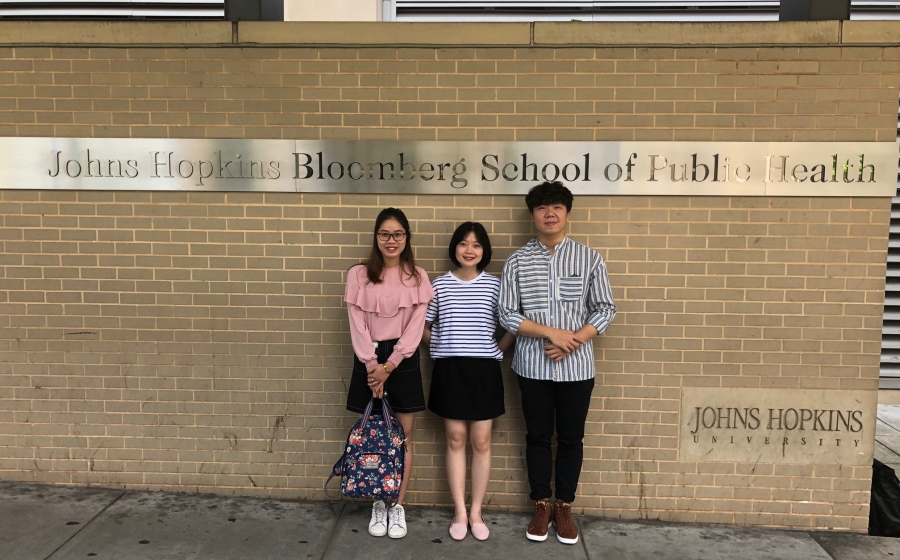Johns Hopkins International Injury Research Unit Hosts Fellows from Hanoi University of Public Health
Before this summer, Thanh Long Nguyen, Quynh Nga Pham, and Nguyen Thi Khanh Huyen had never been to North America. They’d previously never learned in a U.S. classroom. And they’d never had crab cakes.
The three students – all from Hanoi University of Public Health and in the 2-year Master of Public Health (MPH) focused on injury prevention – traveled from Vietnam to Baltimore for the Johns Hopkins University-Hanoi Trauma and Injury Research Program from June 6 to July 20 and picked up valuable professional and cultural experience from start to finish.
“The course has been very useful to learn about this work,” said Thanh Long Nguyen. “It’s bringing me a lot of new experience and is providing me with the opportunity to work with a leading university of public health, with a lot of experience for my career and studies.”
Funded through the National Institutes of Health’s Fogarty International Center, the program invites students from Hanoi to come to the Johns Hopkins Bloomberg School of Public Health and take “Applying Summary Measures of Population Health to Improve Health Systems” and “Hospital-Based Injury/Trauma Surveillance in Low and Middle-Income Countries,” led by Johns Hopkins International Injury Research Unit Director Dr. Abdul Bachani , Assistant Scientist Dr. Andres Vecino-Ortiz, and Associate Director Dr. Amber Mehmood. The courses build upon the students’ MPH program and mentorship from the instructors allow for unique one-on-one guidance, designed specifically for international students.
“Dr. Bachani has a lot of experience in teaching international students,” said Nguyen Thi Khanh Huyen. “The way that he explains questions, he’s very easy to understand and easy to listen to. I was interested in his teaching. “Dr. [Mehmood] was very good, too. She could explain very clearly. If I had questions, she could explains and use a lot of examples and teach us more about realities in the United States.”
Outside of the classroom, the fellowship took students on a handful of site visits, including to PAHO-WHO headquarters to meet with Regional Advisor on Road Safety Dr. Eugenia Maria Rodrigues. The students also visited the Association for Safe International Road Travel (ASIRT). Part of the formal curriculum, the site visits provide key exposure to organizations involved in injury prevention.
Over the duration of the program, they explored Baltimore and the surrounding region, too.
“We went to the Inner Harbor and the Baltimore Museum of Art. And my new favorite food now is crab cakes,” said Quynh Nga Pham. “We also visited more places in New York and Washington, which was a wonderful time.”
“Studying in the United States gives me a lot of experience in how to become better and improve myself,” added Pham. “I met a lot of experts and wonderful teachers in the injury field. They gave me lots of helpful advice about my thesis and how I can perform research in Vietnam.”
Before returning home, the fellows had the opportunity to share their final research concept presentations to JH-IIRU faculty and staff. The subjects of the students’ presentations covered their program research, which included adolescent suicide rates, mobile phone use observations, and pre-hospital emergency care.
“This course can bring you a lot of new experience,” said Thanh Long Nguyen. “You have an opportunity to work with a leading university of public health and it will give them a lot of experience for their career and studies. They’ll have an opportunity to work with a lot of experts and advisors.”
The program is intended to build capacity of injury research in Vietnam. Each year, candidates are selected into the MPH program, the highlight of which is the six-week study abroad component where fellows take a blend of injury specialty classes, develop research ideas, and visit select organizations involved in injury control and prevention.

Fellows from Hanoi University of Public Health participated in a six-week program at the Johns Hopkins Bloomberg School of Public Health.
